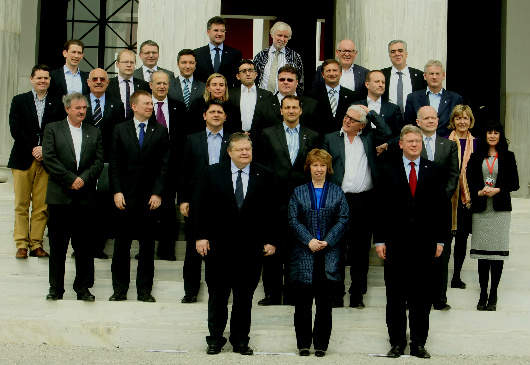 It is a great pleasure to welcome the Foreign Ministers of the EU member states and, naturally, Lady Ashton to the informal meeting of Foreign Ministers.
It is a great pleasure to welcome the Foreign Ministers of the EU member states and, naturally, Lady Ashton to the informal meeting of Foreign Ministers.
Every informal meeting of Foreign Ministers under the Gymnich format is a very important political event. The agenda of this meeting is very heavy and very serious.
The first item is always the ongoing crisis in Ukraine, and also the strategic framework of EU-Russian relations. But we also have another, second item – a permanent one – our Southern Neighbourhood, which is something very important for us, not only because of the very important crisis in Syria, the humanitarian crisis is very important as a political and humanitarian duty for all of us, but also because, for our European Mediterranean space is a permanent structural priority.
We are hosting a meeting that we want to culminate in conclusions that strengthen the European Union’s role as an international political entity, because we want the EU not just to have the ownership of its foreign and security policy, but to be a true international player that is on top of situations and manages crises effectively, always within the framework of international law.
JOURNALIST: [off microphone, question on Ukraine]
E. VENIZELOS The European position is very clear, very strong. The European policy is always a policy of principles. For us, the first pillar is always respect for the international legal order. But to speak practically, the problem now is to organise and promote a new strategic framework for our relationship with Russia, because this is the strong core of the problem.
JOURNALIST: Is it time to be more aggressive with sanctions, I mean Russia hasn't changed its approach.
E. VENIZELOS: The sanctions are an instrument. For us, the target is always the respect of international law, but also, our historical duty is to keep open, the political and diplomatic channel, because a final solution must be a political one, a consensual – a viable and applicable solution. Thank you.
April 4, 2014


